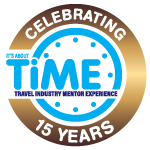A good mentor can change everything. Just ask Maria Antwan.
When she was in her 30s, she decided on an ambitious career change — and moved from the beauty industry into construction.
But when she told people she was starting her own building and project management company in the male-dominated industry, there were a few negative comments.
“Someone said that I’m not qualified … that I’m too young. Someone said that I’ll be easy for the eye for people in the construction industry — some really hurtful things.”
Maria, who has also been a business coach and worked in HR, says it wasn’t something she’d previously had to deal with.
“It’s funny because I had absolutely no experience in beauty and no-one bat an eyelid,” she says.
“Everyone just thought: ‘Oh yeah, you look like you should be doing beauty.’
“But the moment I said I was going to do construction, people started questioning why I was doing this.”
Building trust — and a friendship
Maria signed up to a mentoring program through National Women in Construction, and was matched with a woman who had worked her way from the bottom of the industry to the top.
“My mentor taught me resilience,” Maria says.
“The way that she pushed forward in her industry was so inspiring to me … I knew that I could do that too.”
But Maria says what she ended up getting out of the mentoring program was very different to what she thought she’d signed up for.
It became a friendship. She and her mentor would speak about everything, from holidays to fertility treatment. And Maria says trust was a key part of that.
“I felt like every time I’d see her was peeling off layers and getting to my core beliefs and what I really wanted to do, which ended up leading me into my passion,” she says.
That passion is writing, which she now does alongside her construction work.
“I told [my mentor]: ‘I’m living my passion now and it’s because of you,'” Maria says.
“Honestly, this has been the most life-changing thing.”
Out of your comfort zone
Maria’s foray into an unfamiliar work environment is not uncommon — and experiences like hers are what prompted Madeleine Grummet to launch education-technology start-up Girledworld.
Girledworld aims to help students prepare for the workforce by exposing them to interactive education events, and giving students access to career mentors.
“When you get to secondary school, you get to a bit of a switch point, when you start to imagine yourself beyond school,” Ms Grummet says.
“That’s a really great time to get in and have those conversations and introduce those students to incredible people who are out working, so they can really see what they can be.”
 PHOTO: Madeleine Grummet says testing ideas with new people can expand your thinking. (Supplied: Girledworld)
PHOTO: Madeleine Grummet says testing ideas with new people can expand your thinking. (Supplied: Girledworld)Girledworld was born from a desire to enable “girls to come up in the workforce”, but has since expanded its focus.
“It’s a whole generation who are needing that hand-hold, that mentorship, to help them transition into the new workforce,” Ms Grummet says.
And big companies such as Microsoft and Twitter are on board.
“People inside those businesses are giving up their time and their stories to give students access to what the world of work looks like,” Ms Grummet says.
Ms Grummet says Maria’s experience shows simple mentoring can prove life-changing.
“We all know sitting down and having a conversation with someone, you can sometimes then ignite something in yourself, and curiosity might lead you on a different pathway,” she says.
How to find a good mentor
So how do you go about getting a mentor? The first step is to think about your own needs.
Broken down simply, you’ll need to take into account:
- What industry you are in
- What skills you have
- What skills you are looking to obtain
Then you need to find someone to be your mentor.
Some workplaces have official mentoring programs, but you can also try a less formal method, and simply approach someone you respect and trust.
Ms Grummet suggests having a few informal coffee meetings before formally asking them to mentor you, so you can make sure they’re the right fit.
From there, you can grow that relationship “out to something that has more cadence” — meeting, say, once a month for a set amount of time.
Ms Grummet says you should seek someone who:
- Has a willingness to share skills and knowledge
- Has a positive attitude (because you’re likely to fail a bit)
- Is honest and trustworthy
- Is enthusiastic about where you want to go
- Shares your values so you can forge a human connection
Ms Grummet says everyone can benefit from having a mentor.
“We all need those bridges … to where we’re going next,” she says.
“Most of us in our working lives, in our professional lives, don’t want to stagnate. You want to feel like you’re learning all the time.
“What [mentors] try and do is accelerate that learning and that success.”


